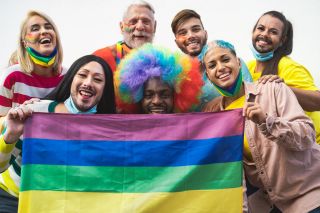Trauma
The Backlash Against All Things LGBTQ
The need to come together has never been greater.
Posted March 11, 2023 Reviewed by Vanessa Lancaster
Key points
- Rejection, persecution, and violence against someone is traumatizing to the person and community. Even the threat of can be enough.
- Vicarious trauma can be triggered by seeing something, such as a movie, hearing about abuse, or reading about it online or in newspapers.
- LGBTQ people must remember the community's value and healing power and support each other.

These are troubling times for members of the LGBTQ community. And while it is important to address politics, as a psychotherapist, I focus on the psychological consequences of those politics in the therapy room.
Today we are seeing a rapidly growing backlash against all things LGBTQ. According to the America Civil Liberties Union, as of March this year, at least 385 anti-LGBTQ laws have been introduced at the state level in most U.S. states. These include everything from banning public drag shows to criminalizing gender-affirming care by medical professionals and even charging parents supportive of their trans kids with child abuse. Many schools are now infected with fear about even mentioning issues of gender identity and sexual orientation. One recent Conservative Political Action Committee (CPAC) speaker even called for the “elimination” of transgenderism. The audience applauded.
This is despite the widespread support for emotional, social, and psychological (i.e., gender-affirming care) by medical organizations, including the American Academy of Pediatrics, the American Psychological Association, the National Association of Social Work, the American Medical Association, and the U.S. Centers for Disease Control. These organizations understand the risks involved when someone, adult or child, experiences gender dysphoria and the rejection of society at large and how gender-affirmative care dramatically reduces depression, anxiety, and suicide attempts.
I’ve written before about the many mental health problems LGBTQ youth face, but let’s look again at the facts: LGBTQ youth are more than four times as likely to attempt suicide than their peers (Johns et al., 2019; Johns et al., 2020). Nearly two million youth (13-24) seriously consider suicide each year in the U.S. Forty-five percent of LGBTQ youth seriously considered attempting suicide in the past year, including more than half of transgender and nonbinary youth surveyed by the Trevor Project, an LGBTQ support organization.
Trauma and Mental Health
Rejection, persecution, and violence against someone are traumatizing (even the threat can be enough), not just for that person. Parents, siblings, friends, and children who witness abuse or other inflicted trauma on loved ones are negatively affected by it–sometimes even worse than the loved one experiencing the abuse. This is known in trauma work as secondary or vicarious trauma and is very real. It can be experienced by simply seeing something such as a movie, hearing about abuse, reading about it on the Internet or newspaper, and so on. It can be debilitating for an individual but can also negatively affect everyone around them.
This is often seen when dealing with families where abuse occurs to one or more family members. Those who are not being abused experience anxiety, depression, feelings of helplessness, hopelessness, and extreme guilt. This is vicarious trauma.
It often produces a “victim” mindset, which causes the person to withdraw from friends and/or family or internally carry an unsettling sensitivity to triggering events. Humans are wired to be affected by and learn from the experiences of others around us. So, it shouldn’t come as a surprise to realize that vicarious trauma spreads virally. The whole of our society is affected by it, even if we aren’t fully aware of it.
Sadly, untreated and unexamined leaves the person going through the world feeling unsafe and believing that the world is dangerous, they are bad and unworthy, and no one would love them if they really knew them.
Empowering the LGBTQ Community and Its Allies
As a therapist, I constantly deal with trauma and victimization in my clients. I see the damage it causes and the resulting isolation. I see how triggering rattles people overtly or covertly and affects those around them.
Although in the earlier days of the fight for LGBTQ rights, there emerged more of a sense of community and shared purpose, this appears to have faded with the rise of tribalism and social media. There is less of a “we” in the letters LGBTQ. There is increasing divisiveness as we struggle to find and keep our own individual voices. Even within subsets of each group, some divisions tend to look upon other subsets as inferior or at least not worthy of their allyship and support. By canceling others within our LGBTQ+ community, we are effectively “canceling” ourselves.
This is one of the reasons why I’m presented with clients who are spiraling down into depression and isolation. One of the first bits of counseling I give is “get active.” That is, getting involved and volunteering with organizations fighting for equality and LGBTQ rights, coming together with others in the community. It is one of the most effective weapons against the powerlessness accompanying victimhood.
Remember your resilience. I tell my clients. As LGBTQ children, you had a lot on your plate. You were living with a secret and suppressing a large part of yourself. You were most likely taught that you didn’t even have God on your side or to talk to because God thought you were an abomination. And you made it! You made it through some of the hardest parts. You can make it through this too. Only this time, it doesn’t have to be alone. Here are some things to do:
- Join an organization and volunteer to help in ways that you can.
- Write letters to your Congressperson.
- Use social media to start accounts reporting discrimination and inviting people to help.
- Make videos about the issues and personalize them to you so people see a human face being affected by all this.
- Get supportive friends that understand and love you.
- Remove people who are not supportive or validating of what is happening in the world, as it negatively affects LGBTQ.
- Invite dialogue with people who don’t understand and agree. The more you talk about it, the stronger you will become.
- Ask others in the LGBTQ community how they are doing and what they might need.
And so, I am appealing to LGBTQ people to begin remembering the value and healing power of community and actively work toward breaking down the silos and tribalism that keep us apart. Protect your mental health. Don’t make your identity around victimhood or allow yourself to be around it. Stand for your agency.
If you or someone you love is contemplating suicide, seek help immediately. For help 24/7, dial 988 for the National Suicide Prevention Lifeline, or reach out to the Crisis Text Line by texting TALK to 741741. To find a therapist, visit the Psychology Today Therapy Directory.




